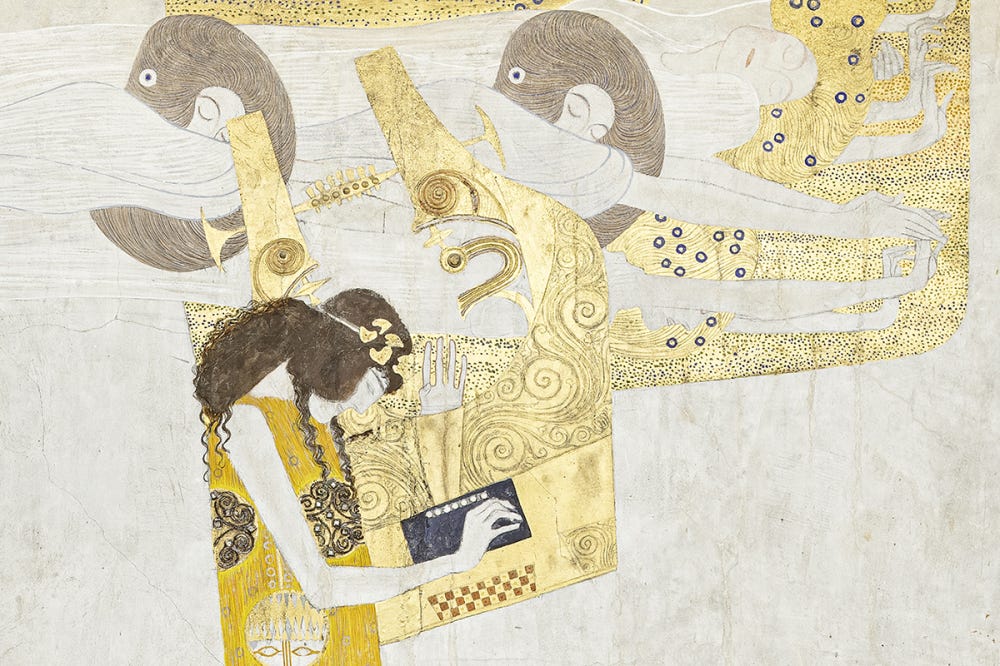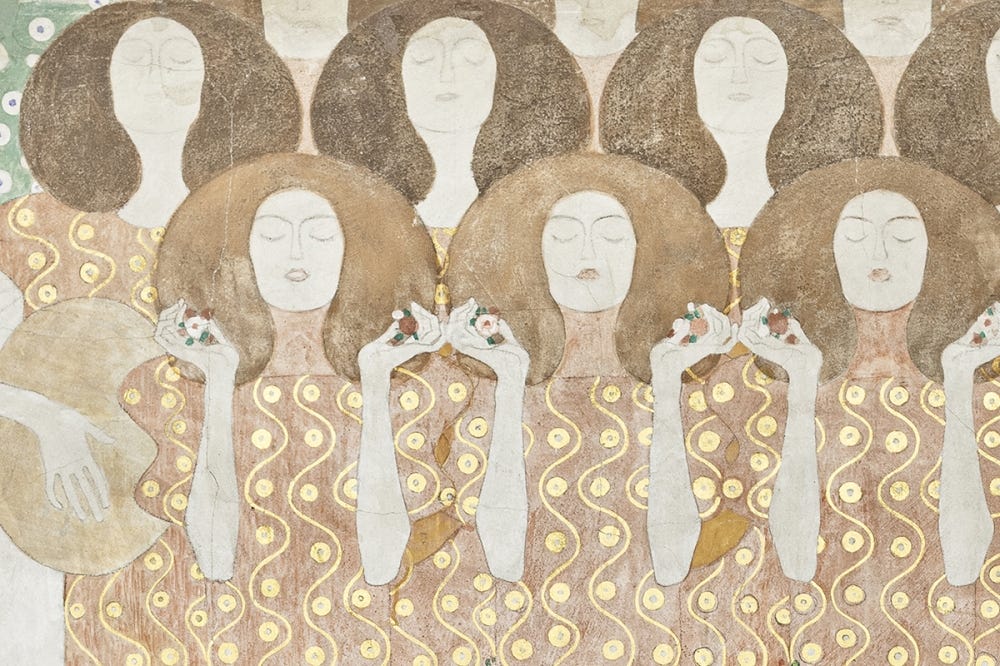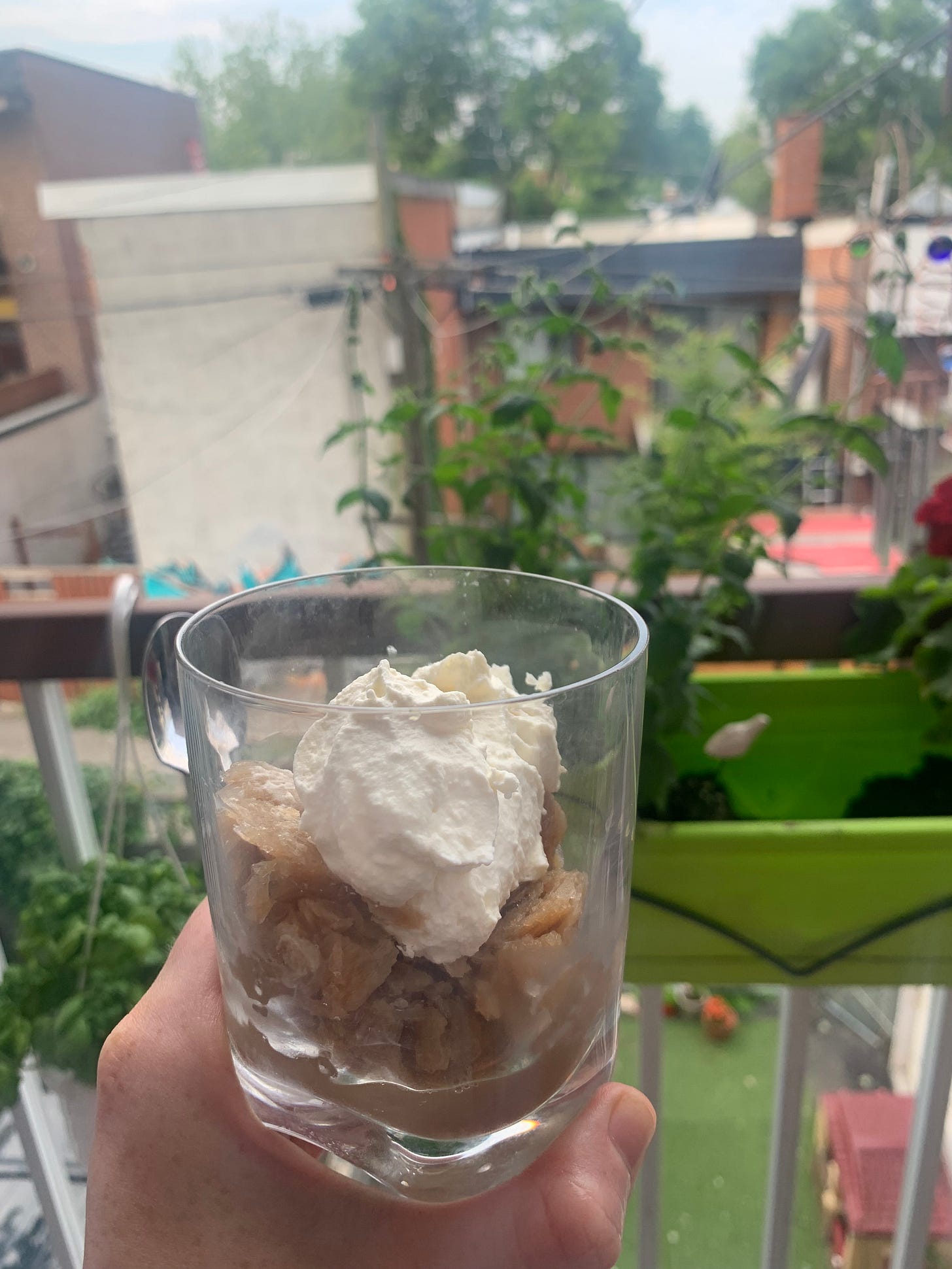vol. 41: beethoven frieze
The Ninth Symphony of Beethoven Understood At Last As A Sexual Message
Saturday morning in Tkaronto preparing to head to soundcheck before my first Beethoven 9 as soloist tonight. I’ve performed it once before as a chorister, years ago under the baton of Lorin Maazel (with whom I went on to sing my first Mahler 4 as a precocious 23-year-old at the Castleton Festival in Virginia) with the London Symphony and soloists including my now friend/mentor Adrianne Pieczonka (&B&B reader!). I was told to never sing it again unless paid to do it as a soloist, as Beethoven’s vocal writing is notoriously punishing. He treats voices instrumentally, with no regard for tessitura or the difficulties of singing consistently in a singer’s passaggio or break. Nevertheless, I am consistently astounded of the beauty and profundity of Beethoven’s music. My favourite parts of Beethoven 9 are perhaps the turbulent conversation in the low strings that starts off the fourth movement, before the Ode to Joy emerges out of nowhere.
Last summer in Austria, one of my favourite pieces anyone sang was Beethoven’s “Abendlied unterm gestirnten Himmel” - “Evening song under the starry heaven.” One of my teachers, Michael Schade—with whom I worked on Beethoven 9—, was coaching it and proclaimed, “What a composer."
Here’s another wonderful Canadian singer, Gerald Finley, singing it with Graham Johnson:
There is something so rich about Beethoven 9, which is why it endures and is so symbolic for many. The text is by Friedrich Schiller (1759-1805), a figure so important in his time that many intellectually minded Europeans changed their last name to Schiller. As Jeremy Eichler writes in his book Time’s Echo: The Second World War, the Holocaust, and the Music of Remembrance:
In their journey from the ghettos to the urban middle class, many German-speaking Jews of central Europe pursued the Bildung ideal as a sort of surrogate religion, complete with a new set of prophets and sacred books. Some families changed their surnames to Schiller, in honour of the great German poet.
My trumpet player boyfriend has been listening to me stress about B9’s vocal demands, and has decided that Beethoven intended it to be a struggle… Perhaps the struggle of humanity for oneness and deliverance that Schiller describes in his text.
(Beethoven’s “Seufzer eines Ungeliebten” - “The sigh of one who is unloved” - performed by myself and Alex Shafirov last summer in Austria.)
Another way I’m preparing for tonight is by diving back into an old childhood favourite, the 1992 HBO Original Film Beethoven Lives Upstairs. It’s one of those educational/fun kids’ films with which my siblings and cousins and I were obsessed as children. I felt slightly validated recalling the scene in which Beethoven has a fight with the soprano and alto soloists about how the vocal parts in his 9th symphony are too high.
I’ve also been thinking back to my time in Vienna exactly one year ago, when I finally visited Gustav Klimt’s 1902 Beethoven Frieze in the Wiener Secession building. The different panels depict elements expressed in Schiller/Beethoven’s Ode to Joy, including wantonness, lasciviousness, grief, ambition, love, and choir of angels. I never cease to be obsessed with Klimt (regardless of his many character flaws). His work is so interesting & varied and stunningly beautiful.
Finally, the late feminist poet Adrienne Rich wrote her own take on Beethoven’s Ninth:
I suppose I could go on and on but the point is, while I’m nervous, I don’t take these little opportunities for granted and am very excited to sing this gorgeous piece for a sold out audience of 700 people tonight at the George Weston Recital Hall in Toronto. Seid umschlungen, Millionen! :)
Recipe post-script:
Beethoven reportedly was meticulous with his coffee (which tbh, so am I). He counted sixty beans for his brew every morning. Two summers ago I enjoyed this Alison Roman recipe for “Very Iced, Very Frozen Coffee,” which I hope you will also enjoy (perhaps as you indulge in Beethoven’s gorgeous music).
Ingredients:
4 cups (945g) strong brewed coffee (cooled)
¼ to ½ cup (55 to 110g) plus 2 tablespoons (25g) sugar, divided
¼ cup (50g) vodka, coffee liqueur, Baileys or bourbon (optional)
¾ cup (175g) heavy cream
¾ cup (6 ounces/170g) mascarpone
Kosher salt
1. In a medium bowl, combine the coffee, ¼ cup (55g) of the sugar, and the vodka (if using), and stir to dissolve the sugar. Taste it—if you like your coffee on the sweeter side, feel free to add the remaining ¼ cup (55g) sugar, or maybe if you’re using a sweet liqueur, like Kahlúa, you might not need it. (It’s OK if it tastes a little too sweet prefreeze; flavors dull the colder they are.)
2. Pour the mixture into a loaf pan, cake pan or shallow baking dish and place in the freezer. Wait for it to freeze (at least 2 hours, depending on your freezer), then use a fork to scrape up the frozen coffee into little fluffy crystals.
3. When ready to serve, in a medium bowl, with a whisk or an electric hand mixer, whisk the heavy cream with the remaining 2 tablespoons (25g) sugar until medium-stiff peaks form. Whisk in the mascarpone and a small pinch of salt.
4. Spoon some of the frozen coffee into a martini glass or coupe, then sort of compact the crystals so they are dense but still edible with a spoon. Top with a perfect little dollop of the whipped mascarpone.










